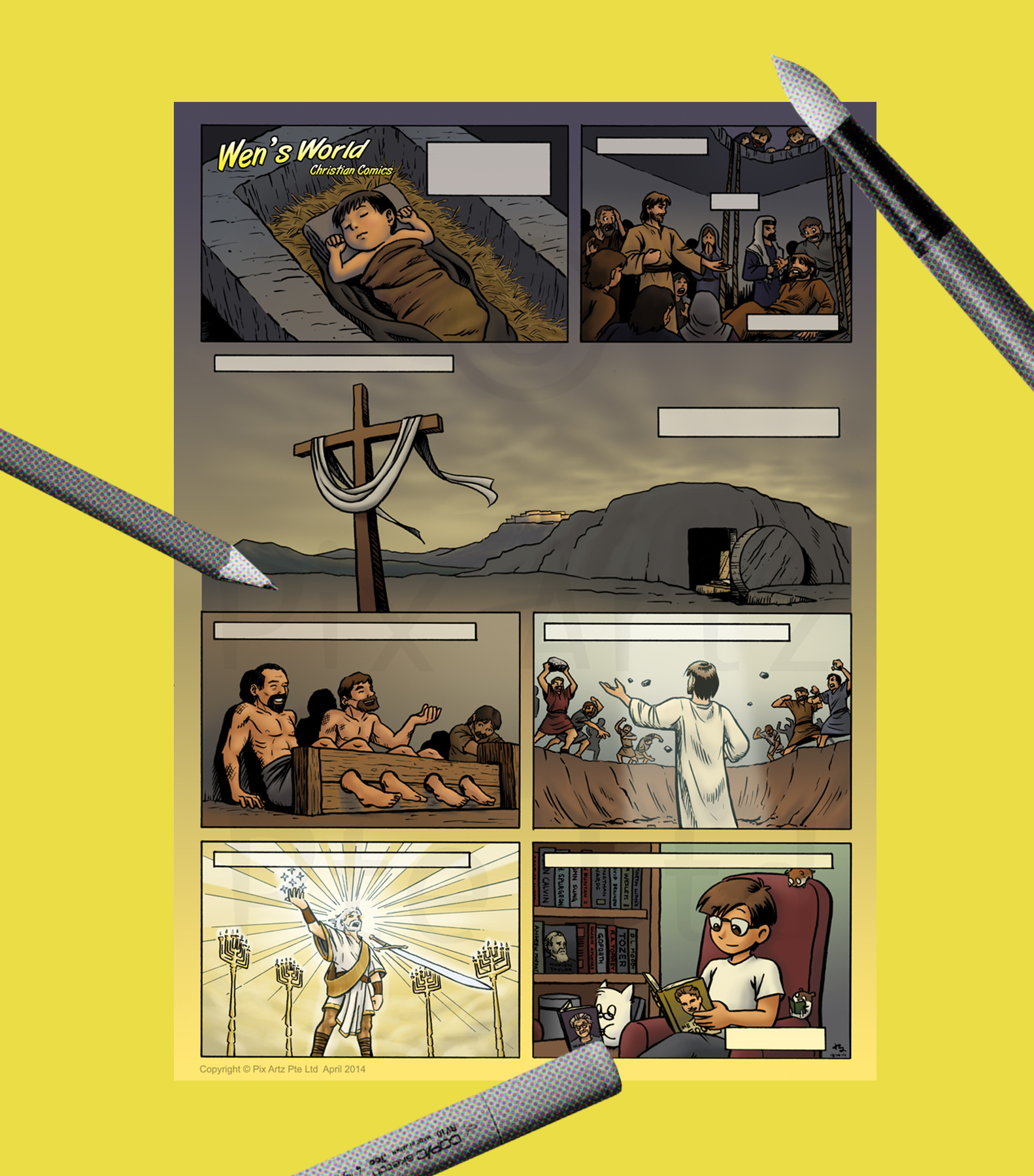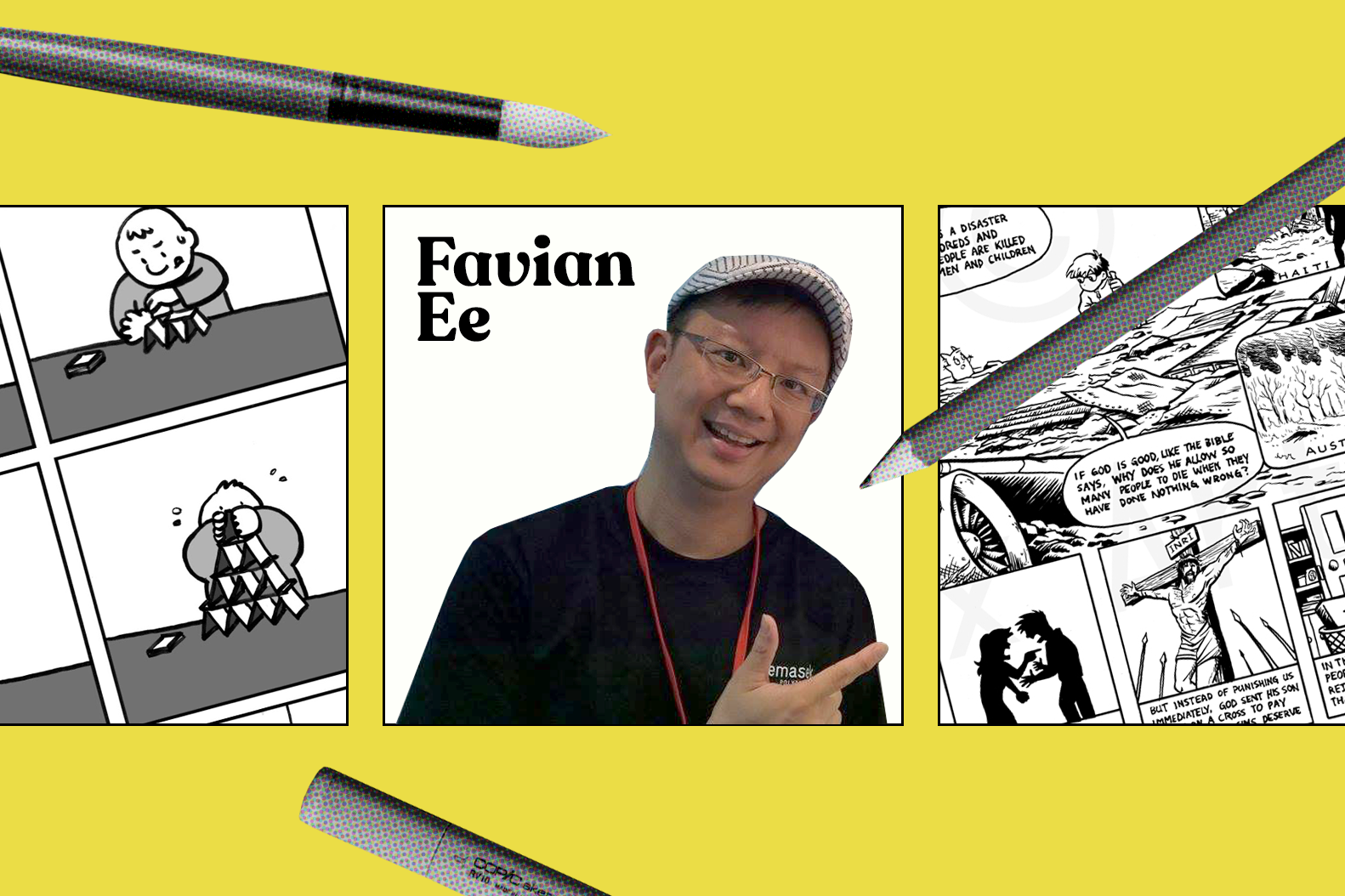About 15 years ago, I was considering a change in career for the first time.
I had graduated over a year before from computer engineering and was working in IT, but I was not doing well. Having had a strong interest in writing and drawing since I was young, I felt I should explore a career in the creative arts.
The pragmatic side of me was what directed me to study computer engineering, but truth be told, I had little passion for computers and IT. I did enjoy creating my own stories, characters and cartoons. But how was I to make a living out of doing that in Singapore?
It was at that time that I heard my pastor say in a sermon, “What if you went to meet God and He told you, ‘I made you for this, and you went to do that?’” That sounded like something I needed to hear.
Perhaps that was the first time I was faced with the question of vocation: What was I made and put here on earth to do?

However, my pragmatic side won out at that time and I went back to IT.
God had to use depression to redirect my path and turn me from IT. I tried running a business selling my works, enrolled and graduated from animation school, went to work in film, quit after 6.5 years and went to teach part time.
Fast forward to today, I was recently given the opportunity to create a biographical graphic novel on the life of John Wesley.
This was the kind of work that God prepared me for and which gives me great satisfaction. It has been a long road, and there’s a longer one ahead.
It was only after 6.5 years working in film and being burnt out that I took my first sabbatical and began to seriously learn about the concept of vocation, or what some might call “life calling”.
People understand this differently. Some think it has to do with going into full-time religious work, or something to make a career out of, or fulfilling some great life purpose like Martin Luther King Jr. or Lee Kuan Yew.

But while vocation may take those forms for some people, it doesn’t for others; yet even so, these other folks also have vocations or callings. Nobody is exempt.
It is not only for the privileged or those with means or for great men — it is for all of us, and we find our place in the world when we find the purpose for which we were made.
If we were made for a purpose, then it must mean that we were made by an intelligent Being who has a plan for our lives, and in a way where fulfilling that plan gives us meaning and satisfaction.
Having a calling implies having a Caller
As a Christian, I believe that the God who made me who I am with my inclinations and circumstances is the One who calls me to fulfil the purpose He has made me for.
I can only discover that purpose when I know the One who calls me. Knowing God is the first step to discovering our vocation.
The One who calls me made me not just an artist or cartoonist. He also made me a son, a friend, a husband, an employee, a citizen.
In other words, I have different responsibilities to different people and institutions that I must fulfil besides my vocation. I may have a primary vocation, but I also have these other secondary callings which I cannot abandon in pursuit of my primary calling.
There will be seasons where some of these callings (such as being a parent or caregiver, or even a student preparing for the work I will do in future) will supersede my primary calling for a time, and that is okay.
My ultimate call is to follow God in obedience to where He calls me at the time, not to sacrifice everything in pursuit of my primary calling and thus make it into an idol. We pursue our calling by pursuing obedience to the Caller. He alone determines the right time for everything.

Being faithful with our calling is often not a straight path. It is a rare person who discovers what he wants to do with his life from his childhood and pursues it unswervingly since then. For most of us, it is a journey of discovery, and that is okay.
Moses took many detours in his life. He felt the urge to save his own people from slavery in Egypt in his 40s, but it took another 40 years of exile as a nomadic shepherd before he was called to return to Egypt and be the deliverer of Israel.
God’s timing is not our timing, but God doesn’t waste our years in the wilderness. Moses’ experience in the fields taking care of large numbers of sheep prepared him for the task of leading a multitude of people through the wilderness.
Sometimes the wait is because God is preparing us for the task. At other times He is putting things in place behind the scenes, preparing the work for us to do. It is not for us to run ahead or lag behind. We must be ready to move when He moves, but not before He does. We wait in faith and move in faith as God calls.
Along my path of discovering my vocation (which is still ongoing), one of the questions I kept asking myself is whether what I desired to do was my own will or God’s will for me.
The other question was more practical: How can I make it sustainable, since doing long-form comic storytelling requires me to be doing it for long stretches at a time and would prohibit me from taking on a full-time job to support it?
Was what I desired to do my own will or God’s will for me? How can I make it sustainable?
To the first question, I’ve come to think that it is not unusual for our calling to manifest in our areas of interest, inclination, and aptitude in our early years. That alone does not mean we must make our interest into our vocation, but these interests may be hints. Not every child who wants to become an astronaut will become an astronaut.
But if a child has a passion to explore the unknown, he could find his place in becoming an explorer or scientist or cosmologist, even if he doesn’t get the chance to go into orbit.
The key, however, is to surrender these desires to God and allow Him to lead and open the doors to fulfilling them in His own time.
Whatever my desires are, they must be congruent with the Bible in order for them to be legitimate. Any violation of Scripture’s commands or principles is an indication that the desire or a particular manner in which the desire is fulfilled comes from myself rather than from God.
And regarding the second question, if God has prepared us for the work He wants us to do, and if He has prepared the work beforehand for us to do (Ephesians 2:10), then it stands to reason that He will also prepare and provide the means for us to do it.

Ultimately, our vocations are not for the sake of self-fulfilment.
Too many have pursued their vocations, careers, even hobbies at the expense of their families and relationships and their own health. Even their spiritual walk with God is sacrificed at the altar of self-realisation. Our vocations are not for us to hoard selfishly, but for the flourishing of humanity.
The Great Commandment is for us to love God with all our hearts, soul, mind, and strength, and to love our neighbours as ourselves. To love our vocation above these is to turn it into an idol and to corrupt its purpose.
God’s call on our lives is not to seek self-fulfilment, but to be fulfilled in God, doing His work by loving and blessing our fellow men.
That is where true satisfaction and fulfilment are found — in relationship with God and others, not simply in the doing of things and enjoying the work. When we answer God’s call and fulfil our calling in accordance to God’s will, others will be blessed and God will be glorified, and He will reward us at the end.
This article was first published on toreally.live and is republished with permission.
- Do you know what your purpose in life is?
- Consider your gifts, talents and skills. How might God use them?
- What are some promises and principles in the Bible you can lean on when it comes to calling?









